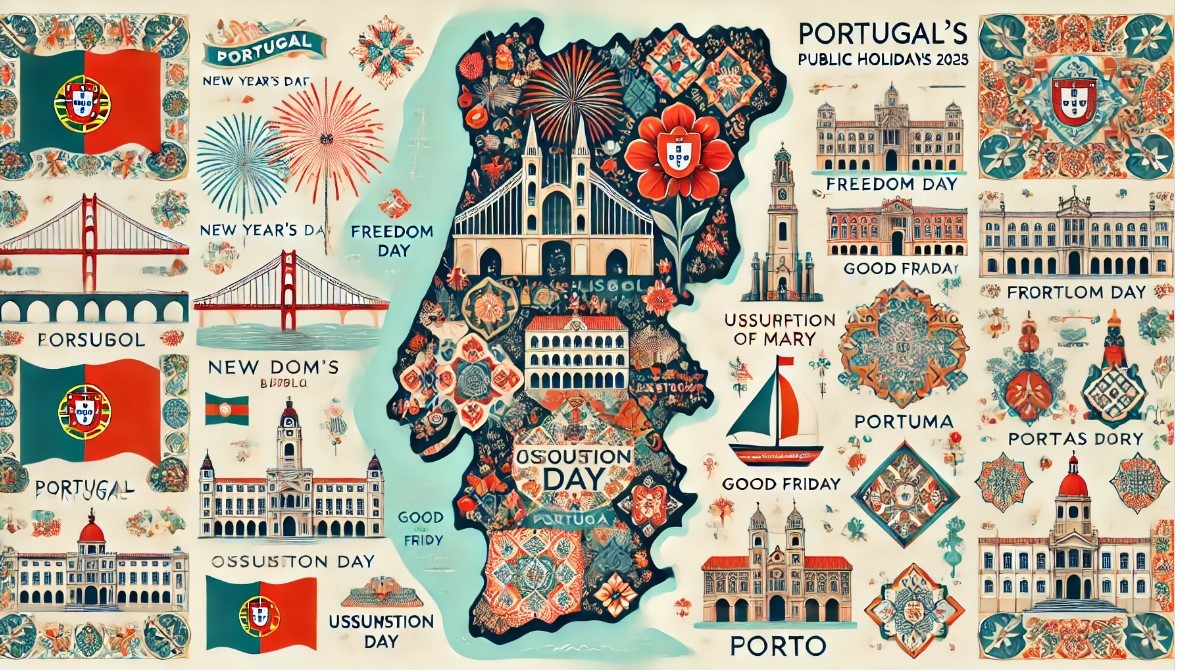Portuguese National Anthem: English Translation, Original Lyrics and History
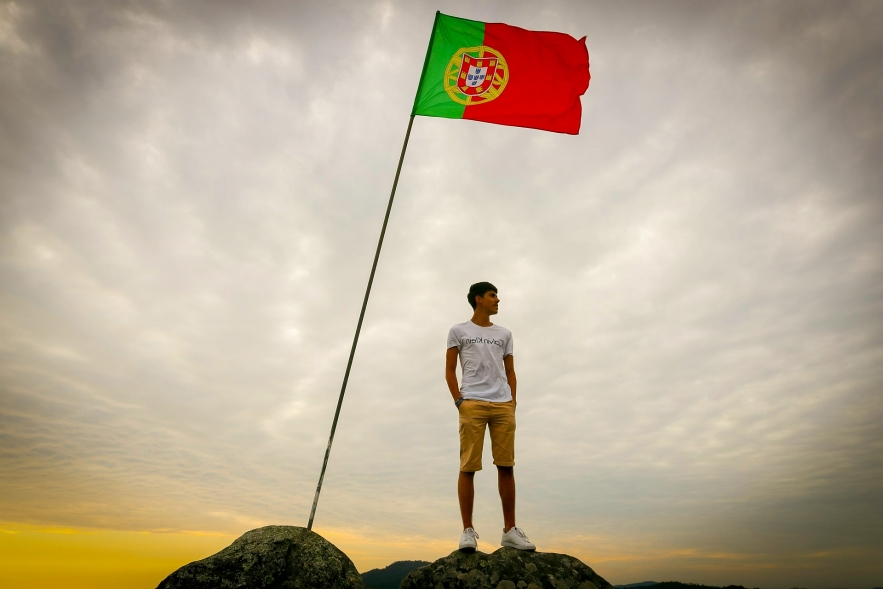 |
| What Is The National Anthem Of Portugal: History and Lyrics In Portuguese and English. Photo learn portuguese |
History of Portugal’s national anthem
Late in the nineteenth century, in vehement protest of Britain's ultimatum to Portugal in 1890 over territorial control of Africa, "A Portuguesa" was conceived.
As the lyrics below show, Portugal considered Britain's reaction a "offense," and historians now believe the ultimatum was a major impetus for the country's Republican Revolution, which ultimately led to the overthrow of the monarchy.
When Romantic composer Alfredo Keil and poet Henrique Lopes de Mendonça collaborated on a protest march at the turn of the 20th century, they had no idea that their song would be adopted as the national anthem after the monarchy was overthrown and replaced by a democratic government.
Because of the many different renditions of the song over the years, the government finally decided on a definitive version in 1956.
In 1956, the melody and instrumentation of the song were both subject to several iterations. The government realized this and established a commission to settle on a single definitive translation of "A Portuguesa." This commission drafted a proposal that has been in effect ever since it was adopted by the Council of Ministers on July 16, 1957.
The current reading was proposed by Portugal's Council of Ministers on July 16 of the following year.
Lyrics to Portugal’s national anthem in Portuguese
Heróis do mar, nobre povo,
Nação valente, imortal,
Levantai hoje de novo
O esplendor de Portugal!
Entre as brumas da memória,
Ó Pátria, sente-se a voz
Dos teus egrégios avós,
Que há-de guiar-te à vitória!
Chorus:
Às armas, às armas!
Sobre a terra, sobre o mar,
Às armas, às armas!
Pela Pátria lutar!
Contra os canhões, marchar, marchar!
Desfralda a invicta Bandeira,
À luz viva do teu céu!
Brade a Europa à terra inteira:
Portugal não pereceu
Beija o solo teu jucundo
O Oceano, a rugir d'amor,
E teu braço vencedor
Deu mundos novos ao Mundo!
(Chorus)
Saudai o Sol que desponta
Sobre um ridente porvir;
Seja o eco de uma afronta
O sinal do ressurgir.
Raios dessa aurora forte
São como beijos de mãe,
Que nos guardam, nos sustêm,
Contra as injúrias da sorte.
(Chorus)
Lyrics to Portugal’s national anthem in English
Heroes of the sea, noble people,
Valiant and immortal nation,
Raise once again today
The splendor of Portugal!
Among the haze of memory,
Oh Fatherland, one feels the voice
Of your distinguished forefathers,
That shall lead you on to victory!
Chorus:
To arms, to arms!
Over land, over sea,
To arms, to arms!
For the Fatherland, fight!
Against the cannons, march on, march on!
Hoist the undefeated flag,
In the lively light of your sky!
May Europe cry out to the whole Earth:
Portugal has not perished
Kiss your merry ground
The ocean, roaring with love,
And your victorious arm
Gave new worlds to the world!
(Chorus)
Salute the Sun that rises
Over a gleeful future;
Let the echo of an offence
Be the sign for a comeback.
Rays of this strong dawn
Are like a mother’s kisses,
That keep us, sustain us,
Against the injuries of fate.
(Chorus)
Cultural symbols of Portugal
AZULEJOS
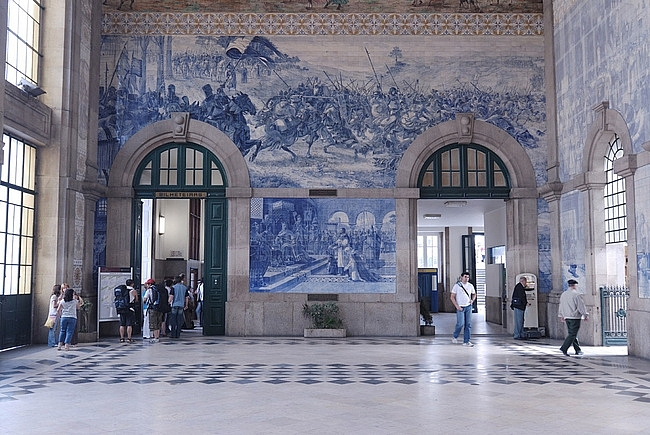 |
| Cultural symbols of Portugal - Photo: ibericalanguages |
This ubiquitous feature of Portuguese architecture is a trademark of the country. Famous painted tin-glazed ceramic tiles may be found everywhere in Portugal, from the smallest of towns to the largest city of Lisbon.
These tiles can be found decorating the walls of churches and monasteries, palaces, homes, park benches, fountains, businesses, and even train stations (like Porto's So Bento). These can be used as street signs or house numbers, but more commonly they depict historical events, the country's most stunning natural landscapes, or both.
It was with the intention of mimicking Roman mosaics that the Arabic phrase az-zulayj, meaning "polished stone," was borrowed to describe azulejos. This name originated with the Moors, and it wasn't until the Christian reconquest of the Iberian Peninsula in the 15th century that azulejos were transported to Portugal from Spain.
FADO
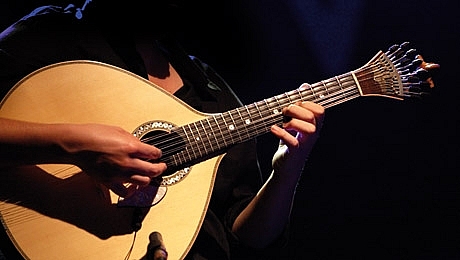 |
| Photo ibericalanguages |
Fado is a type of Portuguese music that has become a potent symbol of the country's unique culture. Though the name is clearly derived from the Latin word for "fate," "fatum," the genesis of the genre still raises debates among academics. It's a style of music known for its somber melodies and lyrics, which frequently focus on the ocean or the plight of the poor. The recurring topic in many of these songs is "saudade," a Portuguese word that literally means "longing" but also connotes feelings of melancholy, fatalism, and resignation.
Lisbon and Coimbra are the two centers from which Fado emerged. Solo performers only sing it in Lisbon, whereas groups of male college students frequently perform it in Coimbra. An essential part of every trip to Lisbon is a meal and show at a "casa de Fado," or traditional Fado house. The Bairro Alto neighborhood has a plethora of them, although Alfama, the neighborhood where the style was first developed, has the best examples.
Throughout the 20th century, fado gained popularity outside of Portugal, mostly due to the efforts of Amalia Rodrigues, often known as "Rainha do Fado" (Queen of Fado). When she passed away in 1999, she was seen as essential in shaping the genre's direction, and three days of national mourning were announced.
Modern fado vocalists include Dulce Pontes, Ana Moura, and Carlos do Carmo, but Mariza is by far the most well-known.
UNESCO added Fado to their list of Intangible Cultural Treasures in 2011.
GALO DE BARCELOS
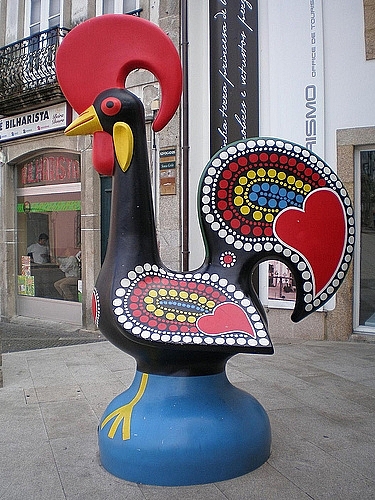 |
| Photo ibericalanguages |
Honesty, trust, integrity, and honor are all represented by the Galo de Barcelos, the Portuguese national symbol. Its lucky associations don't end there.
The silver was stolen from a landowner in Barcelos (to the east of Braga, in northern Portugal) who vanished without a trace, so the narrative goes. At one point, a mysterious outsider showed up in town and was immediately suspected of stealing all the silver. Though he maintained his innocence, he was found guilty and given the death penalty. He begged the executioner to make the rooster crow three times to prove his innocence. The rooster crows three times before the judge, and the foreigner is freed.
In addition to ceramic roosters, the Galo de Barcelos can be found embroidered on towels, aprons, and key chains, and can even be found in stamp sets sold at tourist stores. The Rooster of Barcelos stands out wherever it appears thanks to its bright hues.
TUNA
Not to be confused with the fish of the same name, a tuna is a group of students that perform as a musical ensemble while dressed in the customary regalia of their academic institution and engaging in musical serenades. The medieval troubadours of Spain and Portugal are credited with starting the custom in the 13th century. Back then, it was a means to an end—a means to get by and eat. These days, students join "tunas" less for the financial benefits and more for the sake of tradition, socialization, and adventure.
The traditional "uniform" of the Tuna people ranges from medieval garb to the more contemporary black suit of Iberian students in the 17th century.
A long black cape, reaching just above the ankles, is always wrapped around the character to round off the look. Although you might hear a singing tuna group in the streets of a Spanish city or village occasionally, encountering one is much more likely in Portugal.
TRADITIONAL CUISINE
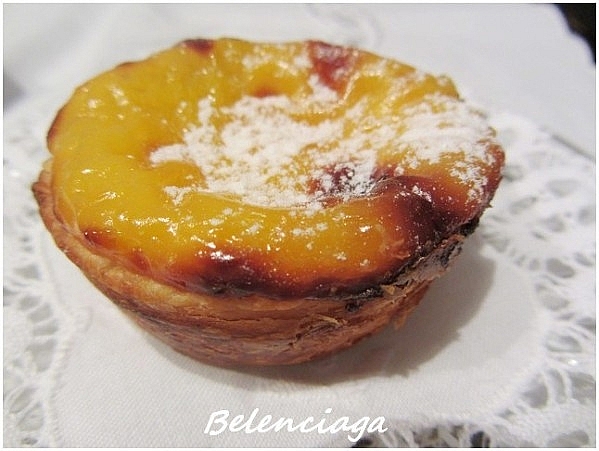 |
| Photo ibericalanguages |
When we think of traditional Portuguese food and drink, the first thing that comes to mind is bacalhau, a salted dried cod that, legend has it, can be prepared in 365 different ways. In Portugal, bacalhau is a regional delicacy, with dishes like bacalhau à Gomes de S representing Porto (salted cod, potatoes and onions topped with eggs and onions).
While shellfish and fish play a central role in Portuguese cooking, meat and soups like the famed caldo verde (made with mashed potatoes, green Galician cabbage, olive oil, and black pudding) are also staples. Famous Portuguese delicacies like pastel de Belen and wines like vinho verde and Port deserve a mention. Further information on Portugal's excellent cuisine and wine will be available in our upcoming blog post.
 What is The National Anthem Of China: English Version, Original Lyrics and History What is The National Anthem Of China: English Version, Original Lyrics and History The national anthem of China, ‘March of the Volunteers’ is a communist anthem reflecting the country’s values of courage, resolution and unity. Read on to ... |
 Spanish Version of US National Anthem: Full Lyrics, History and Official Translation Spanish Version of US National Anthem: Full Lyrics, History and Official Translation Check out US National Anthem, ‘The Star-Spangled Banner’, in Spanish lyrics, versions, official translation and history ect. |
 World's Longest Train Journeys: New Record with Portugal to Singapore World's Longest Train Journeys: New Record with Portugal to Singapore If you are not in a hurry to reach your destination and want to slow down the time, then the world’s longest train journeys are ... |




